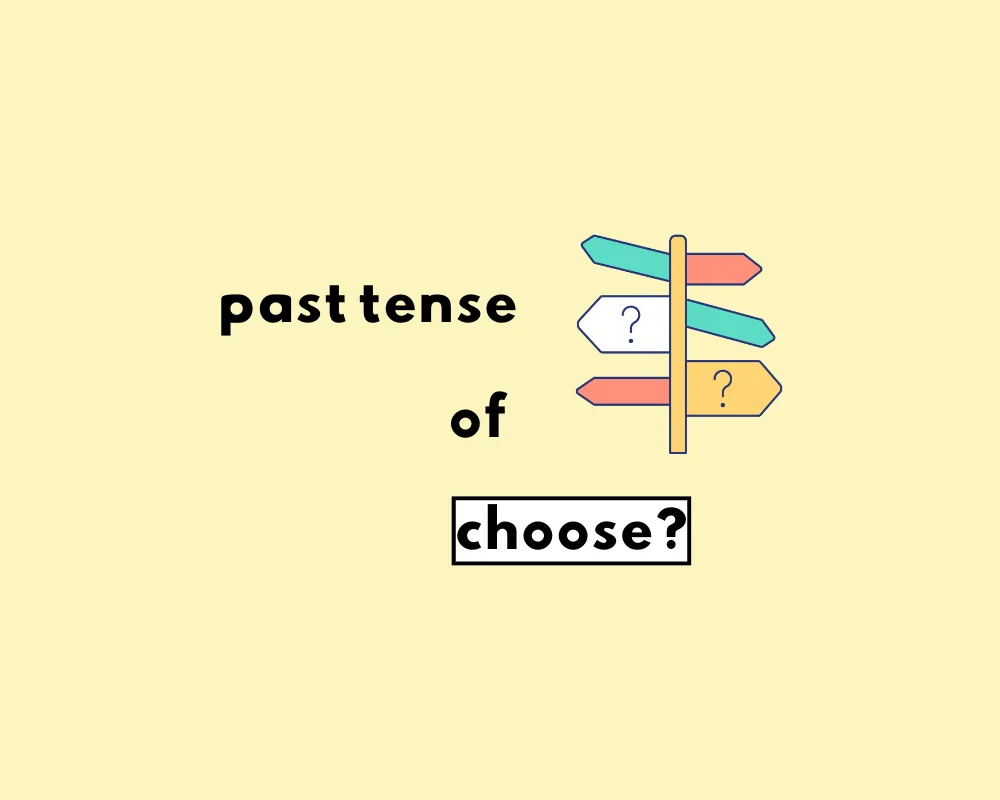Contents
Toggle
What’s the past tense of “choose”?
To choose (which sounds like chews, and rhymes with shoes) is the verb form of the noun choice.
- Chose is the simple past tense of choose,
- Chosen (rhymes with frozen) is the past participle.
The verb choose is an irregular verb with two past verb forms, chose and chosen, neither of which end in -ed.
Verb forms of choose
| present | past | future | |
| simple | I choose | I chose | I will choose |
| continuous | I am choosing | I was choosing | I will be choosing |
| perfect | I have chosen | I had chosen | I will have rung |
| perfect continuous | I have been choosing | I had been choosing | I will have been choosing |
What’s the definition of “choice”?
As a matter of course, let’s define subject topics first: the word choice, importantly, is a noun, and is defined as “to select from a number of possibilities; pick by preference: ‘the choice is yours to make‘.
That’s the distinction here: choice is a noun, and functions as such in sentences; whereas choose is the verb form of the noun, choice. Chose is the simple past tense of choose, and chosen is the past participle.
What’s the difference between chose and chosen?
Compare the following sentences:
I chose the pasta. (simple past)
By the time I arrived at the restaurant, they had already chosen a table. (past perfect)
The first sentence describes an action that is completed, or something that took place entirely in the past. That’s the past simple tense. The second sentence, which uses the past participle ‘chosen‘, forms a different tense in English called the past perfect tense, also known as pluperfect.
To form the past perfect tense, we use the past participle + ‘had‘. The past perfect tense shows when an action took place before another event or action in the past. We use the past perfect when we want to clarify the order in which past events took place. So, in sum, we use ‘chosen‘ when we want to form the past perfect tense or in modal verb constructions (i.e., I should have chosen something different).
“Choose” / “chose” / “chosen”, used in sentences
| Examples: choose, used in sentences |
|---|
| Why did you choose this restaurant? I couldn’t choose between the number of options before me. Which should I choose, pasta or pizza? I don’t choose to keep such company. |
| Examples: chose / chosen, used in sentences |
|---|
| The contestant chose what was behind door number three. We were given a choice between coconuts and starvation, and we chose coconuts. We chose a new cooker from the gas showroom. She chose an academic career. I thought I was marrying a man who had chosen a lifestyle compatible with mine. He couldn’t have chosen a more appropriate song. |
Synonyms of choose
Like with all synonyms, make sure to use the appropriate word given the context in which it’s being used.
- adopt
- appoint
- determine
- elect
- embrace
- favour
- espouse
- commit oneself
- take up
- make up one’s mind
- settle upon something
- make a decision
The origin of choice
From etymology online on choice (n.):
Old English ceosan “choose, seek out, select from two or more; decide, test, taste, try; accept, approve”.
In review: tenses of choose
To choose is present tense, chose is the past tense, and chosen is the past participle; (pairs with auxiliary verbs to create the perfect and progressive tenses).
Learn more about verbs
- What are regular and irregular verbs?
- Transitive and intransitive verbs?
- What are verbs?
- Past tense of spread?
- What’re personal pronouns?
- What’s the difference between they’re, their, and there?
- Whose vs who’s?
Sources
- Merriam-Webster, Definition of choice.
- Etymology online, Origin of choice.
- English Grammar and Composition, P.C. Wren and Martin, participles.











